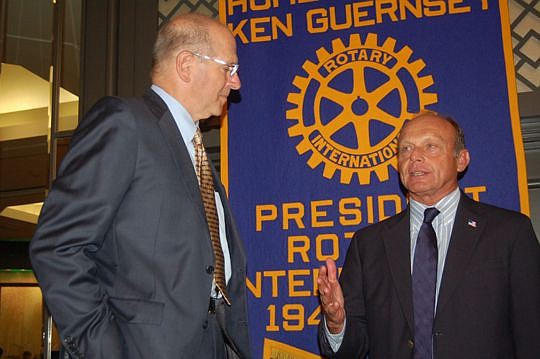
Join the Navy and see the world.
That was a recruiting slogan when Bob Buehn was commissioned as an ensign in 1978.
During his 30-year career as an aviator, squadron commander and commanding officer, Buehn got to see quite a bit of the world. From Jacksonville’s three bases (Cecil Field Naval Air Station, Jacksonville Naval Air Station and Mayport Naval Station) to duty stations in the Pacific and the Middle East.
After he retired with the rank of captain, Buehn took some time off for fishing and writing articles for a few outdoors publications, making use of the journalism degree he earned at the University of Florida.
When he decided it was too early to retire at age 56, Buehn joined former Mayor John Peyton’s administration as chief of the Military Affairs, Veterans and Disabled Services Division.
One of the highlights of his naval career, Buehn said Monday to members of the Rotary Club of Jacksonville, was his tour of duty as commanding officer of U.S. Naval Station Guantanamo Bay, Cuba.
Located about 500 miles from Havana, the base was established after the Spanish-American War under the terms of a permanent lease agreement between the Cuban government and the United States.
After Fidel Castro took over Cuba more than 50 years ago, the base was completely isolated— including mine fields along the perimeter. It has remained so since.
When Buehn arrived at the base in 2000, he was expecting a quiet three-year assignment in paradise and soon learned to appreciate the area’s natural resources and recreational opportunities.
“I went diving and sailing and caught 100-pound tarpon on a fly rod,” said Buehn. “It’s a gorgeous, unspoiled part of the world.”
Being commanding officer at Guantanamo was “20 percent military officer and 80 percent small-town mayor,” Buehn said.
When Buehn arrived, there was no cable television and very little Internet access, but the base did boast the only McDonald’s restaurant in Cuba.
Once each month, Buehn had a meeting with his counterpart, a general in the Cuban army, to discuss “fence-line issues,” such as combined efforts to fight brush fires or the Cuban government’s protests over the signal strength of the commercial radio station operated on the base.
There were lighter moments, too, that led to the base being known as much as “Mayberry” as a U.S. military outpost in a communist country.
Buehn said one morning he got a telephone call informing him there was a man walking along the base’s main street with an AK-47 slung over his shoulder. A Cuban soldier had jumped the fence seeking asylum, Buehn said.
The soldier was granted asylum, but Buehn had to decide what to do with the assault rifle, so he called his friend the general. A few days later, U.S. Marines handed the rifle over the fence to the Cuban military.
“I could never predict what was going to happen,” said Buehn.
That became an understatement soon after Sept. 11, 2001. Security at U.S. military installations worldwide was elevated to its highest level. That took on its own meaning at Guantanamo.
Buehn said since the base was completely isolated — after military personnel and their dependents arrived, they never left the base until they went to their next duty station — everybody knew everybody else.
“We finally just stopped checking each other’s IDs,” he said.
When the U.S. war on terrorism began taking prisoners in Afghanistan, the government needed a place to incarcerate the detainees.
After considering locations including islands in the Pacific Ocean and maximum security federal prisons, the decision was made to take the suspected terrorists to Guantanamo.
On Dec. 23, 2001, Buehn was notified that about 300 detainees would arrive in three weeks.
“We had a brig with four cells. One of them had a rocking chair. It really was Mayberry,” Buehn said.
By the time the first group of detainees arrived, 40 cells were ready in “Camp X-Ray.” It operated for about 90 days while a larger, more secure facility was built on the base.
Incarcerating terror suspects at Guantanamo has been a source of controversy from the beginning with many suggesting the facility should be closed.
Buehn said he could support that outcome because the suspects detained at Guantanamo are not technically prisoners of war, but they also haven’t been charged with a crime.
“Maybe that’s the right thing to do,” he said. “It wouldn’t be hard to close the Gitmo detention facility and transfer the detainees to another location.”
@DRMaxDowntown
(904) 356-2466